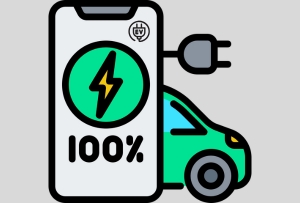Brief Overview of the Growth in the Electric Vehicle (EV) Market in Australia
At Experion Technologies, we specialize in crafting cutting-edge custom EV charging software that caters to the growing demands of the electric vehicle market, empowering businesses to deliver seamless, efficient, and sustainable solutions.
Australia’s electric vehicle market is experiencing unprecedented growth, driven by government initiatives, increasing environmental awareness, and the rise of sustainable technologies. With the number of EVs on the roads steadily increasing, the need for efficient and scalable electric vehicle charging software has become more pressing than ever.
Importance of Efficient EV Charging Infrastructure in Australia
A robust EV charging infrastructure is critical to the adoption and growth of electric vehicles across Australia. The success of the EV movement hinges on the accessibility and reliability of charging stations. Urban centers, where EV penetration is rising rapidly, demand high-density, efficient solutions, while remote areas require widespread infrastructure to ensure connectivity across vast distances.
Reliable EV charging management software acts as the foundation for this infrastructure, ensuring that stations operate seamlessly, minimize downtime, and optimize energy consumption. By providing real-time updates, predictive maintenance alerts, and dynamic load balancing, the software helps prevent bottlenecks and ensures uninterrupted services. This fosters trust among EV owners and instills confidence in businesses to invest further in expanding the network. With Australia’s commitment to sustainability and green energy, an efficient charging infrastructure aligns with national goals while supporting economic and environmental progress.
What is EV Charging Software?

EV charging software is an advanced technological solution designed to manage and streamline the operations of electric vehicle charging stations. This software enables communication between various stakeholders, including EV owners, charging networks, and operators, ensuring smooth, automated, and efficient workflows.
At its core, EV charging software integrates multiple functionalities, such as real-time station monitoring, payment processing, and energy optimization. By bridging the gap between user demands and operational needs, the software enhances user experience while simultaneously improving the efficiency of charging stations.
For instance, through its real-time capabilities, the software allows operators to monitor station health, manage charging schedules, and even predict energy demands based on historical data. For users, it simplifies the charging process with features like app-based station discovery, digital payments, and consumption tracking, making the transition to electric vehicles more accessible and appealing.
Importance of Custom EV Charging Software
 In an industry as dynamic as EV infrastructure, off-the-shelf solutions often fail to address the unique needs of individual businesses and locations. This is where custom EV charging software becomes essential. Tailored software solutions cater specifically to the operational challenges, geographical requirements, and business objectives of charging networks.
In an industry as dynamic as EV infrastructure, off-the-shelf solutions often fail to address the unique needs of individual businesses and locations. This is where custom EV charging software becomes essential. Tailored software solutions cater specifically to the operational challenges, geographical requirements, and business objectives of charging networks.
Solving Operational Challenges
Custom solutions can address unique challenges, such as load management in high-demand areas or optimizing energy costs by integrating with renewable energy sources. Businesses operating in remote regions or high-traffic urban zones can benefit from software tailored to their specific conditions, ensuring seamless operation under any circumstance.
Enhancing User Experience
User satisfaction is paramount in driving EV adoption. Custom software enables businesses to create personalized experiences, such as user-friendly interfaces, loyalty programs, or multi-language support, ensuring inclusivity and satisfaction. Features like automated billing, tailored promotions, and real-time customer support create a seamless charging journey.
Adapting to Evolving Market Needs
The EV market is evolving rapidly, with new technologies and trends emerging, such as vehicle-to-grid (V2G) solutions and AI-driven predictive analytics. Custom software offers the flexibility to integrate these advancements, ensuring that businesses remain competitive and future-ready.
At Experion Technologies, we excel in delivering custom EV charging solutions that align perfectly with your business goals. Our expertise spans building highly scalable, intuitive, and innovative software that adapts to ever-changing market trends.
Key Stakeholders
Understanding the roles of key stakeholders is crucial in the success of EV charging infrastructure. Each group has a unique impact on the adoption and operation of EV charging systems.
- EV Owners: The driving force behind the demand for charging infrastructure, EV owners require seamless access to charging stations, intuitive interfaces, and a smooth user experience. Ensuring that EV owners can easily locate, book, and pay for charging services is paramount. Custom EV charging software provides an easy-to-use interface, integrated mobile apps, and real-time station availability updates, making it easier for users to adopt EVs with confidence.
- Charging Station Operators: These entities are responsible for managing the physical and operational aspects of EV charging stations. EV charging management software provides station operators with real-time data on the status of each charging unit, enabling proactive maintenance and ensuring uptime. The software also supports revenue tracking, dynamic pricing, and load balancing, which optimize operations and ensure profitability.
- Energy Providers: Energy providers play an integral role in integrating renewable and traditional energy solutions with charging networks. Energy management systems in EV charging software help manage energy distribution, making sure that the grid isn’t overburdened, and optimizing energy use during peak and off-peak hours. The software can even forecast energy needs based on charging patterns and seasonal demand, enabling energy providers to plan accordingly.
- Government and Regulators: Governments set policies and regulations that guide the growth of the EV market. These regulations ensure sustainability and energy efficiency goals are met while promoting innovation. EV charging software must comply with government policies, including emission standards and data protection regulations, while also contributing to the country’s sustainability efforts. With built-in compliance features, EV charging software ensures that operators and businesses can meet all regulatory requirements without disruption.
Benefits of Using EV Charging Software
EV charging software offers numerous advantages for both businesses and users, making it a must-have solution for growing charging networks.
- Enhanced User Experience through Real-Time Updates: Users benefit from real-time information about station availability, charging status, and estimated completion times. Notifications on delays, updates on pricing, and the ability to book charging slots in advance enhance customer satisfaction and loyalty.
- Optimized Energy Consumption and Reduced Costs: By tracking energy usage patterns, EV charging software enables operators to implement strategies such as load balancing, energy scheduling, and integration with renewable energy sources, helping to minimize operational costs and reduce environmental impact.
- Streamlined Operations for Charging Station Operators: With automated maintenance alerts, fault diagnostics, and performance tracking, the software simplifies day-to-day operations for station operators. This reduces downtime and improves operational efficiency, leading to cost savings and increased customer trust.
- Advanced Reporting for Data-Driven Decisions: EV charging software delivers comprehensive insights through detailed reports and analytics, covering station performance, energy usage, user behavior, and revenue trends. These insights allow operators to make informed decisions, improve efficiency, and adapt their services to meet customer needs.
Key Features of EV Charging Software

The right EV charging software should offer a robust set of features that empower operators, users, and energy providers. Key features include:
Real-Time Monitoring and Management
Monitoring the health and operational status of charging stations in real-time ensures that potential issues are identified and resolved quickly, reducing downtime and improving station reliability. This feature provides station operators with comprehensive data on charger usage, station performance, and even the ability to predict when maintenance will be needed based on usage trends.
Payment and Billing Systems
A seamless payment system is critical to enhancing the user experience and ensuring that stations are financially sustainable. EV charging software typically integrates secure, easy-to-use payment options, including mobile app payments, contactless payment methods, and automated billing. This ensures that EV owners can pay for their charging sessions quickly and securely.
User Management
User management features facilitate the creation of accounts, saving user preferences, and offering customer support through integrated channels. By providing a personalized experience, the software enhances customer satisfaction and increases loyalty. Whether it’s tracking charging history, offering discounts, or managing loyalty programs, this feature strengthens the customer-business relationship.
Energy Management
Efficient energy distribution is crucial to the sustainability of EV charging infrastructure. Energy management features help balance supply and demand, especially when integrating renewable energy sources or managing energy during peak demand periods. This not only reduces costs but also helps ensure grid stability and supports a cleaner, greener energy future.
Reporting and Analytics
Analytics dashboards provide detailed insights into station performance, energy usage, customer behavior, and financial metrics. This allows businesses to monitor usage trends, identify inefficiencies, and optimize pricing strategies. EV charging software also offers tools to track revenue, usage per station, and customer behavior to improve operational strategies.
Software Integration
EV charging software must integrate smoothly with various third-party systems, such as energy management platforms, mobile apps, and fleet management solutions. By enabling seamless communication between different systems, the software provides a unified view of the entire charging ecosystem. For example, integration with fleet management software allows operators to optimize charging schedules for commercial fleets.
Challenges and Future Trends in EV Charging Software

As the demand for electric vehicles (EVs) continues to rise, so does the complexity of EV charging infrastructure. To ensure the seamless operation and growth of this ecosystem, addressing both current challenges and emerging trends is essential.
Current Challenges
Interoperability: Ensuring Seamless Integration Across Platforms
Interoperability remains one of the biggest hurdles in the EV charging space. With a growing number of charging stations, vehicle models, and software platforms, ensuring that they work together smoothly is essential for a positive user experience. Charging stations need to be compatible with a wide range of electric vehicles, as well as different payment methods, user interfaces, and network protocols.
EV charging software must support cross-platform integration, providing uniformity across systems and ensuring that EV owners can access charging stations regardless of brand or model. This requires sophisticated software architecture capable of connecting diverse technologies and standardizing data across platforms.
Cybersecurity: Securing the Digital Infrastructure of EV Charging Networks
As EV charging systems become increasingly digitized, they become more vulnerable to cyberattacks. Hackers can potentially disrupt charging services, steal sensitive user data, or damage infrastructure. Ensuring the safety of user data and the integrity of the entire charging network is critical.
EV charging software must be designed with robust cybersecurity features, including end-to-end encryption, secure payment gateways, and regular software updates to protect against emerging threats. Additionally, maintaining compliance with cybersecurity regulations and standards is key to building trust among users and operators.
The Path Forward: Addressing Interoperability and Cybersecurity Challenges
To overcome these challenges, the EV charging industry is turning to innovative solutions that can future-proof systems and enhance security.
- AI-driven Diagnostics: Artificial Intelligence (AI) plays a crucial role in predictive maintenance and diagnostics. AI can detect potential issues in charging stations before they occur, minimizing downtime and ensuring a smooth user experience. By monitoring the health of charging stations in real-time, AI can alert operators to issues like hardware malfunctions, energy imbalances, or even cybersecurity threats, allowing for quick resolution and ensuring high reliability of the network.
- Blockchain for Secure Transactions: Blockchain technology offers a secure and transparent way to manage transactions across the EV charging network. With blockchain, user transactions, billing, and even the sharing of energy resources between vehicles and the grid can be securely tracked and recorded. This technology also enhances transparency, reducing the risk of fraud and providing an immutable record of all transactions.
Additionally, blockchain can support new charging models, such as vehicle-to-grid (V2G) systems, where EV owners sell surplus energy back to the grid. The transparency and security offered by blockchain will make these systems more reliable and trustworthy.
Future Trends: AI and Machine Learning, V2G Technology, Blockchain Integration
As the EV charging landscape evolves, new technologies will play a significant role in transforming how charging systems operate:
- AI and Machine Learning (ML): Predictive analytics powered by AI and machine learning will become a key part of EV charging software. These technologies enable operators to forecast demand, optimize charging schedules, and adjust energy distribution based on real-time usage patterns. AI will also enhance customer experience by providing personalized charging recommendations based on an individual’s usage habits, while also enabling proactive maintenance by predicting when stations need repairs or upgrades.
- V2G (Vehicle-to-Grid) Technology: V2G technology allows electric vehicles to not only draw power from the grid but also feed energy back into it. This capability optimizes energy distribution and supports grid stability, especially during peak demand times. As more electric vehicles are integrated into the grid, V2G technology will help balance supply and demand, ensuring that renewable energy resources are used effectively and that EV owners can contribute to energy savings. EV charging software will need to support V2G systems, enabling seamless two-way energy flow and ensuring optimal charging times.
- Blockchain Integration: Blockchain will continue to play a transformative role in ensuring secure, transparent, and decentralized transactions in EV charging. By integrating blockchain with EV charging software, operators can ensure that transactions are fully traceable, reducing the risk of fraud and errors in billing. Blockchain will also support the development of new business models, such as EV owners sharing energy with other vehicles or the grid in exchange for rewards or credits.
How to Select the Best EV Charging Software
Choosing the right EV charging software is crucial to the success of your charging infrastructure. Key considerations include:
- Scalability: As the EV market grows, your charging network must be able to scale efficiently. Look for software that can easily expand with the growing number of users, charging stations, and technologies.
- Ease of Integration: The best software will seamlessly integrate with your existing systems and third-party platforms, such as energy management systems, payment gateways, and mobile apps. It should be flexible enough to adapt to changes and new technologies.
- User-Friendly Interfaces: A simple, intuitive user interface is critical for both operators and customers. The software should offer easy-to-use features for monitoring stations, managing users, and tracking energy consumption.
- Robust Security: Protecting your network and user data should be a top priority. Choose software that offers advanced security features, including encryption, fraud prevention, and regular updates to keep the system secure.
Conclusion
As the demand for electric vehicles (EVs) soars in Australia, there is an urgent need for efficient and scalable infrastructure to support this shift toward sustainability. EV charging software plays a critical role in streamlining operations, enhancing user experiences, and driving future innovations. Custom solutions, like those provided by Experion Technologies, ensure businesses can adapt to the evolving landscape, overcome operational challenges, and deliver seamless services to both users and operators.
The future of the EV industry is bright, with groundbreaking trends like AI, V2G (Vehicle-to-Grid), and blockchain poised to transform the way EV charging networks operate. With a focus on security, scalability, and optimization, the right software will be instrumental in supporting the growth of this green movement. By leveraging cutting-edge technologies and adopting tailored solutions, businesses can stay ahead of the curve in an increasingly competitive and dynamic market.
Key Takeaways
- Australia’s EV Market Growth: The Australian electric vehicle market is expanding rapidly, and with this growth comes the need for robust and efficient EV charging infrastructure. Investing in reliable and scalable EV charging management software is crucial to ensure the seamless adoption of electric vehicles nationwide.
- Importance of Efficient Charging Infrastructure: A well-developed EV charging infrastructure is critical not just in urban centers but also in remote regions. Efficient EV charging software ensures that operations run smoothly, builds trust with users, and strengthens the foundation for the future of EV adoption in Australia.
- Benefits of Custom EV Charging Software: Custom EV charging software offers businesses the flexibility to address unique operational challenges and adapt to market needs. It provides significant advantages in improving user experience, optimizing energy consumption, and streamlining management processes for charging station operators.
- Key Features of EV Charging Software: Key functionalities like real-time monitoring, secure payment and billing systems, user management, energy distribution optimization, and seamless software integration are essential for the smooth operation of EV charging stations. These features support operational efficiency, reduce costs, and provide valuable insights into performance and user behavior.
- The Role of AI, V2G, and Blockchain: Emerging technologies like AI for predictive analytics, V2G (Vehicle-to-Grid) for energy optimization, and blockchain for secure transactions will shape the future of EV charging software. These innovations enhance the efficiency, security, and reliability of charging networks while enabling new business models.
- Challenges in EV Charging Software: Addressing challenges such as interoperability between different hardware and software systems and ensuring cybersecurity to protect sensitive user data and infrastructure are essential to maintaining the integrity and reliability of EV charging networks.
- Selecting the Right EV Charging Software: When choosing EV charging software, businesses should focus on scalability, ease of integration, user-friendly interfaces, and robust security. Partnering with experienced software providers like Experion Technologies ensures the deployment of efficient, secure, and customized solutions.
- Scalability for Future Growth: As the EV market continues to expand, scalability is key. EV charging software must be flexible enough to scale with the growth of the industry, ensuring seamless integration with new technologies, additional charging stations, and increased customer demands.
- Optimized Energy Distribution: Energy management plays a vital role in reducing operational costs and ensuring sustainability. By utilizing intelligent algorithms, EV charging software can optimize energy distribution across charging stations, improve grid usage, and support green energy initiatives.
- Reporting and Analytics for Data-Driven Decisions: Detailed reporting and analytics enable charging station operators to make informed decisions, enhance station performance, and track key metrics such as energy consumption, revenue, and user behavior.
- The Importance of Software Integration: Integration with third-party systems, such as energy management platforms, fleet management solutions, and mobile apps, ensures a seamless experience for both operators and users. This connectivity enables efficient management of all aspects of EV charging infrastructure.
- Building a Sustainable Future with EV Charging Solutions: As the world moves toward more sustainable energy solutions, integrating EV charging software that promotes sustainability and reduces environmental impact is essential for contributing to global efforts in combating climate change.
- Experion Technologies as a Trusted Partner: With extensive experience and expertise in delivering tailored solutions, Experion stands ready to transform your EV charging software vision into reality. Whether you need a custom solution for your unique business needs or are seeking to scale your infrastructure, Experion provides cutting-edge technology and strategic insights to power the future of EV infrastructure in Australia.
Empowering the EV ecosystem with innovative and robust software solutions, Experion Technologies ensures that your business is well-equipped to meet the growing demands of the electric vehicle revolution. With a focus on reliability, scalability, and future-proofing, Experion is the partner you need to transform your EV charging network for a sustainable tomorrow.

